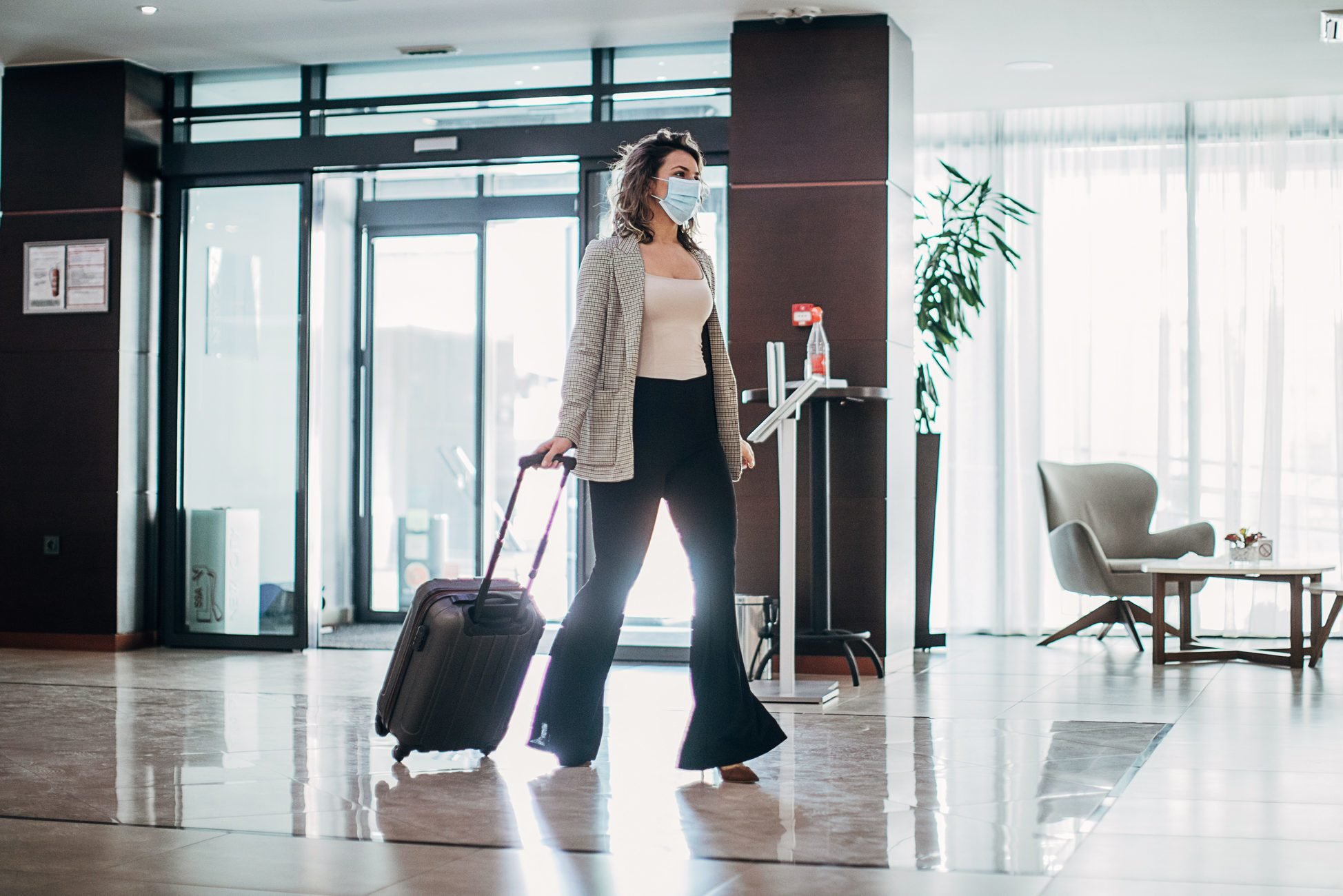
The new hotel environment
Seasoned travelers who have their hotel routines solidified may be in for a rude awakening once their business and pleasure trips resume—the whole industry has had a makeover, thanks to COVID-19 health concerns. “For example, here in Las Vegas, the average casino has made 800 policy changes in the wake of COVID,” says Jon Taffer, award-winning hospitality expert, world-renowned business consultant, and executive producer and star of Paramount Network’s Bar Rescue reality show. “State-to-state standards differ, but in almost every case, the hotel standards are considerably above that of the state, or even the CDC’s, recommendations. A lot of technology and process changes have really gone a long way toward ensuring sanitary safety. The depth of the detail is really remarkable.” Brush up on the 11 rules the CDC wants you to follow before traveling again, and then familiarize yourself with this “new normal” of hotel life.
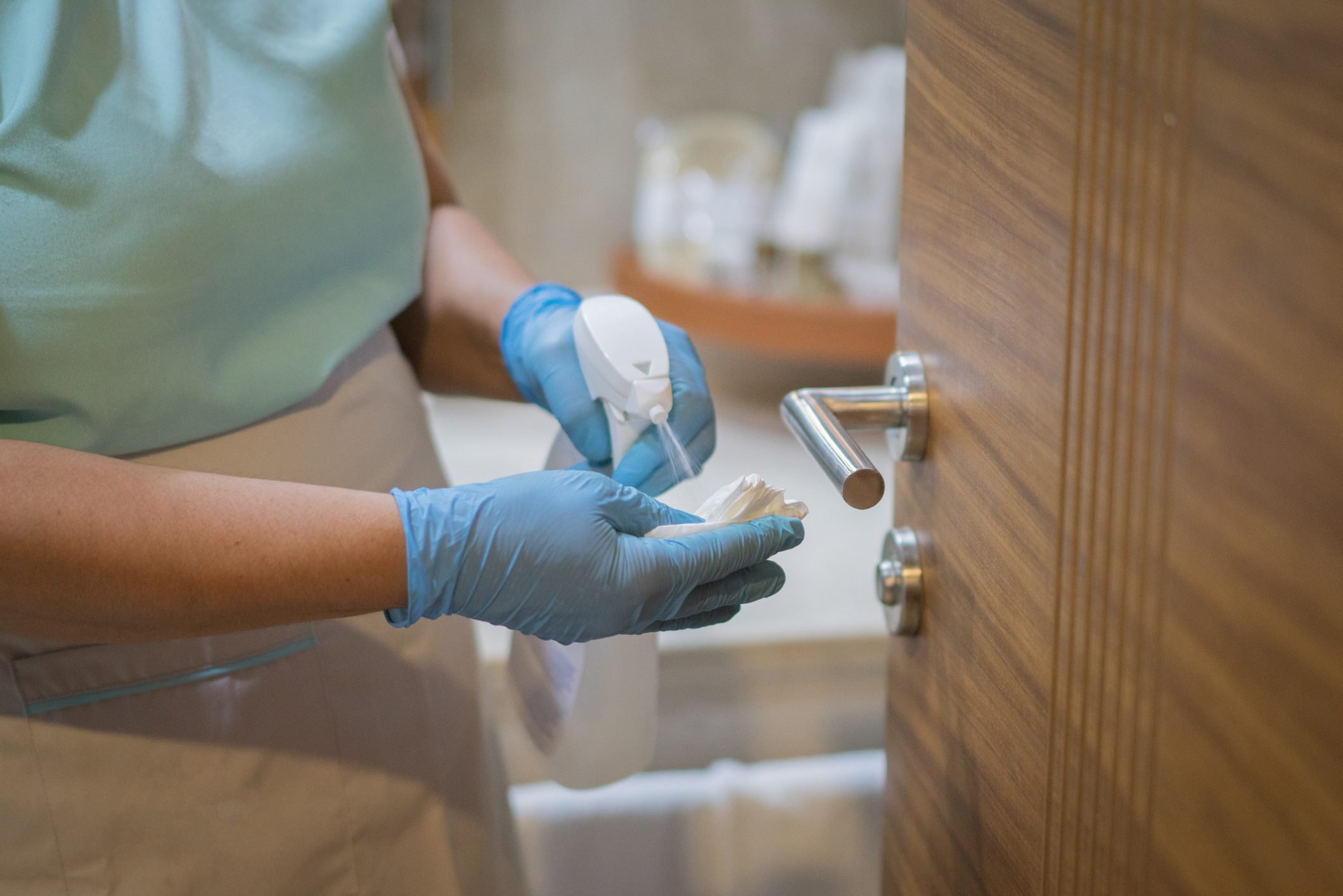
New standards for cleaning and sterilization
“Huge hotel companies, and even medium-hotel companies, have all hired biotech or bio-risk firms that have come in and put together certification and training programs,” says Taffer, of the sanitation measures hotels are taking to mitigate risk. For example, Hilton has teamed up with the maker of Lysol and experts from the Mayo Clinic’s Infection Prevention and Control team to create its CleanStay protection program—aka, enhanced cleaning and disinfection protocols to give guests peace of mind.
“Their employees have 36 hours of training,” says Taffer. “Think about that depth of commitment: 36 hours in training to make sure that they’re putting on their protective gear correctly, and removing it correctly. What they touch, what they don’t. To make sure they are using the right chemicals in the right places.” He says many properties have even created a new role—hygiene manager—to focus specifically on hygiene, sanitation, training, systems, chemicals, and procedures. No matter how clean your hotel is, you’ll still want to wash your hands after touching these 10 things.
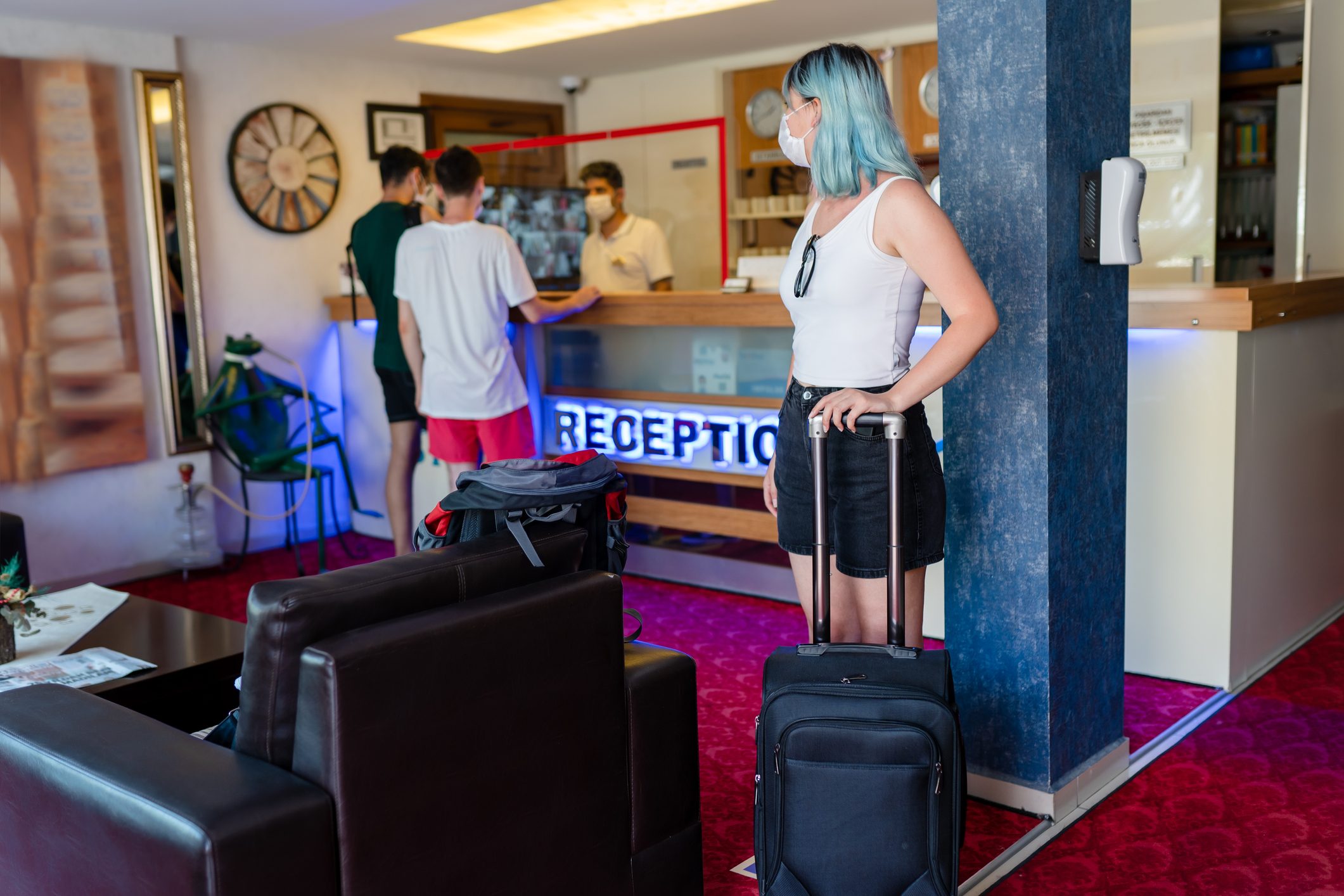
Social distancing in public spaces
Extroverts and lonely business travelers may be used to spending more time in lively hotel lobbies than their rooms—but not in a post-pandemic world. “Social lobbies—like what W Hotels has been known for, with bumping music to encourage interaction and fun—may become a thing of the past,” says James Jack La Russo, a committee member of NYC & Company’s Hotel PR Board. “And efficient lobbies to redirect traffic and allow ample social distance will become standard.”
To manage social distancing in elevators, Taffer says hotels now have signage that indicates the maximum number of guests who can be in an elevator at one time. “In some of the higher-volume elevators in Las Vegas casinos, crowds can block signage, so in those cases, there’s actually hosts in those elevator lobbies protecting guests,” he says. In other instances, as with the Kimpton Hotel Arras in Asheville, North Carolina, the hotel’s elevator technology sends guests directly to their floor without stopping to pick up other passengers. Before selecting your next vacation spot, check out the best U.S. hotels and resorts for social distancing.
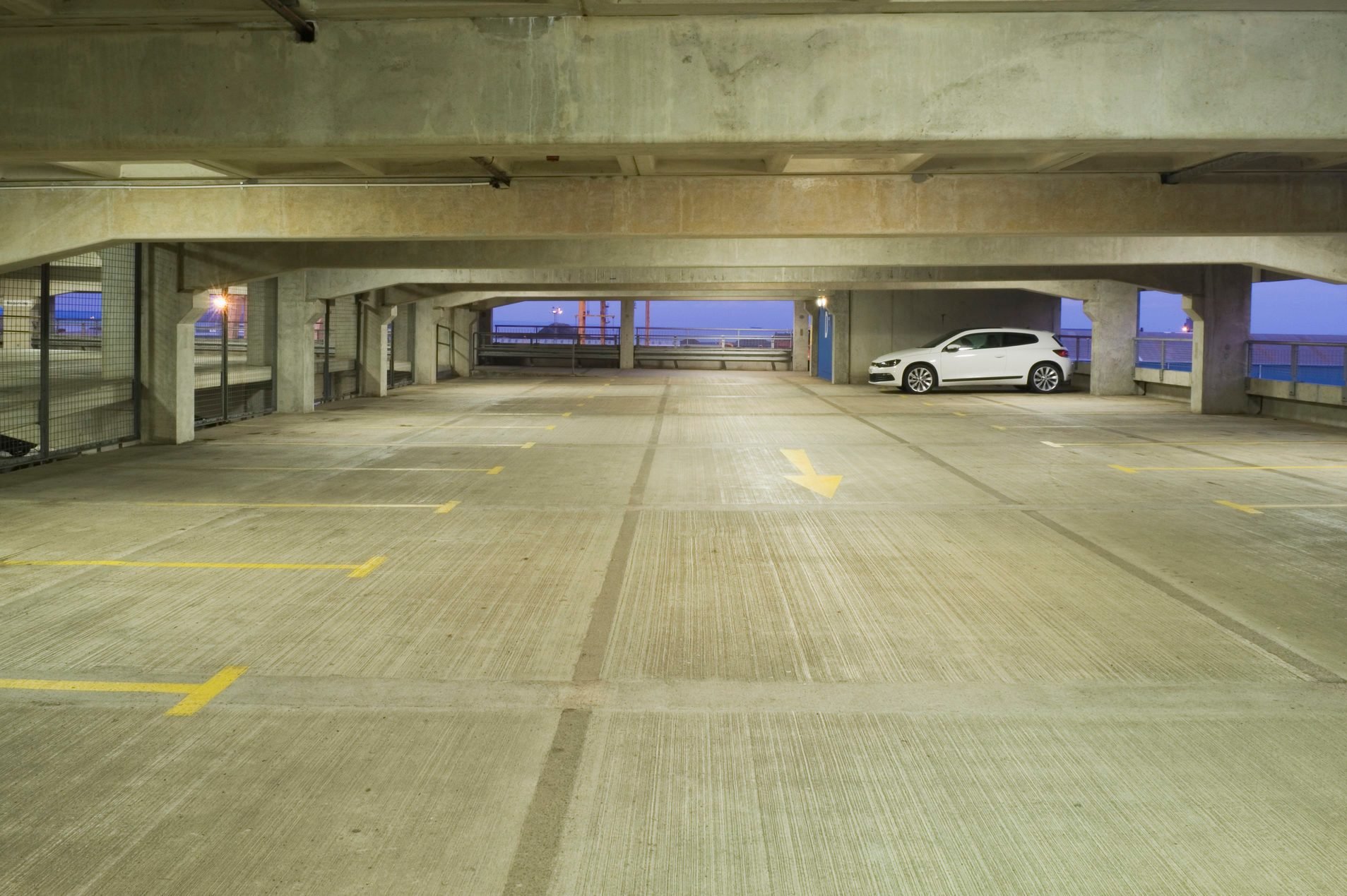
Park your own car
Valet parking is a perk many hotel-goers have grown accustomed to, but you may be hard-pressed to find that option now. “Cars are much too tight of quarters to have someone who can potentially be sick in them,” says Rob DelliBovi, a hospitality consultant who has worked with over 140 hotels and brands. “The current standard operating procedure is to keep the windows down, but there is still way too much risk there in my opinion. This will be a struggle for city hotels—they’ll have to find, map out, and broker a deal with the best local parking situation they can find and allow guests to park their own cars.” Alternatively, The Palms Hotel & Spa in Miami Beach still offers the service, but valets not only wear masks and clean gloves for each car but also sanitize the keys and any area inside the car they touch. Valets aren’t the only thing disappearing from hotels.
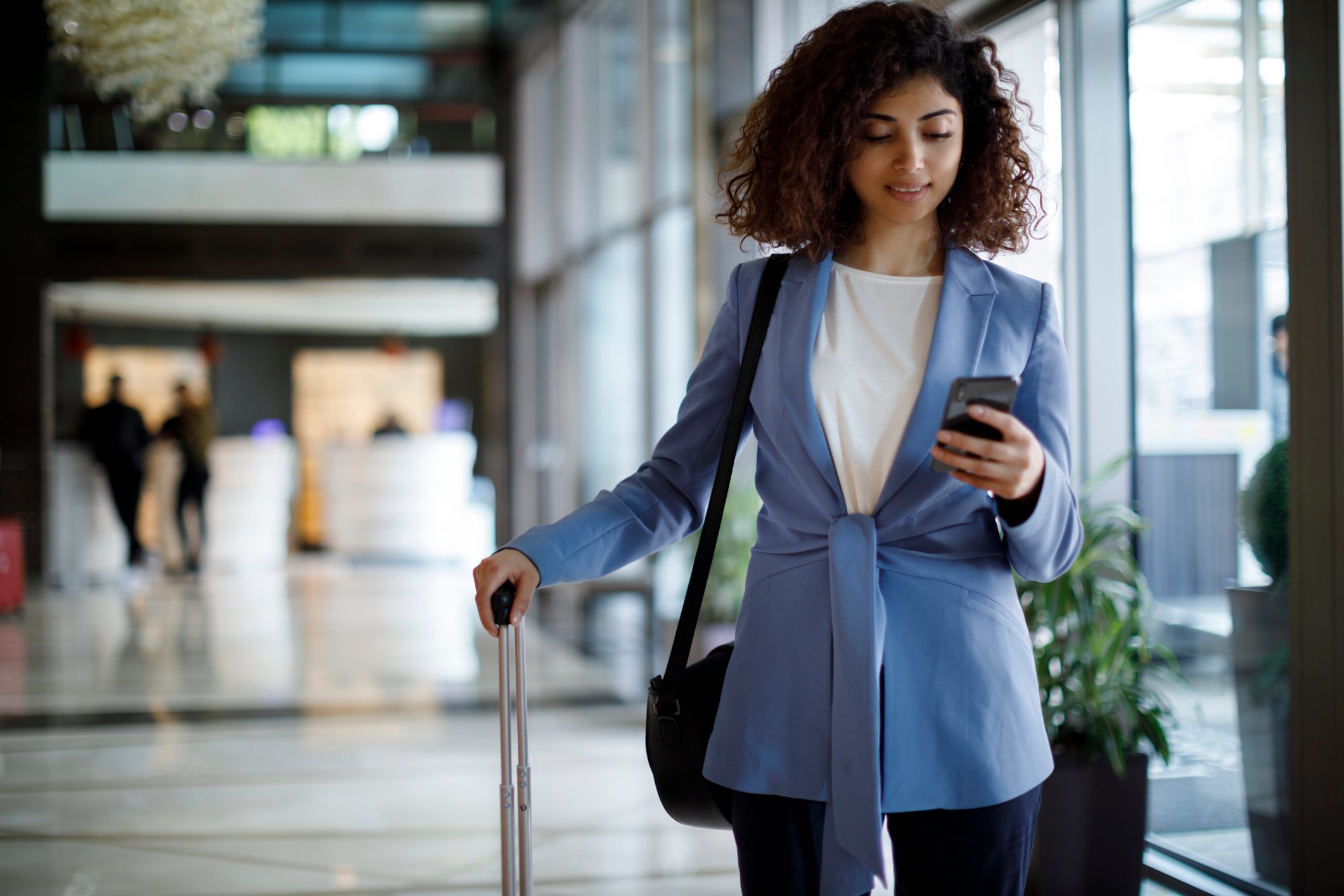
Contactless check-in
Thanks to technology, one of the 10 things you won’t see in hotels anymore are front-desk check-ins. That’s because many hotels have converted to a contactless check-in process (aka, mobile check-in) to help reduce or eliminate lines in lobbies and prevent the need to pass things—like credit cards and pens—back and forth between guests and staff. “Now there are sanitized keys that are pre-wrapped, almost like a baseball card used to come in,” explains Taffer. In some hotels, you can even use your own credit card or the property’s app on your smartphone to get into your room.
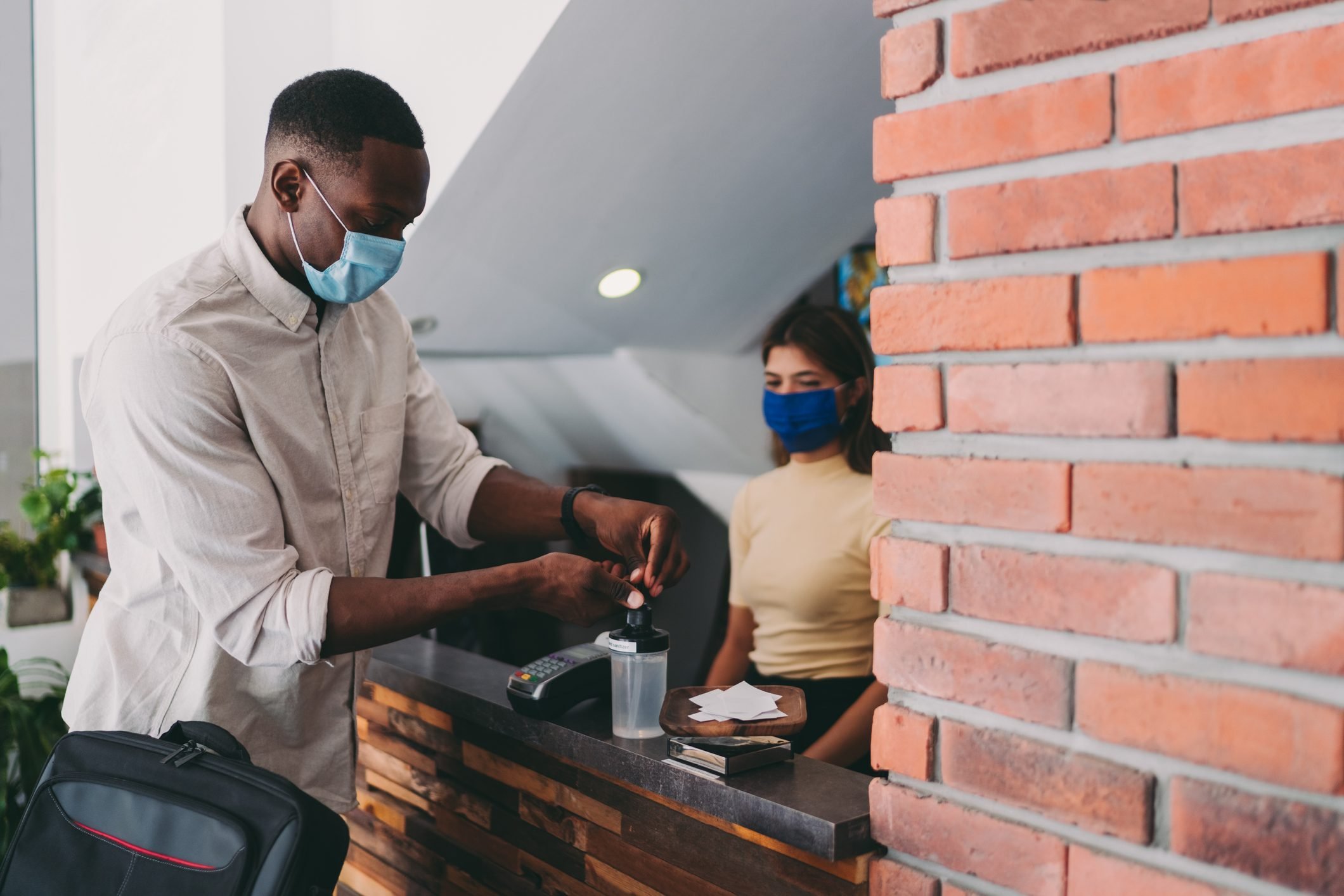
Sanitizing stations throughout the property
While it’s probably wise to keep a little bottle of hand sanitizer in your purse or pocket these days, many hotels are also offering ample hand sanitizer stations. “The St. Regis in Atlanta is doing the best job of this,” says DelliBovi. “They had a hand sanitizer station in and next to every door and elevator and button that you could possibly touch.” At The Roundtree, Amagansett in New York, guests can even sterilize their small personal items (such as keys, pens, cell phones, and baby bottles) in FDA-registered medical devices. It’s not only hotels that are changing; find out the things you won’t be able to do on airplanes anymore.
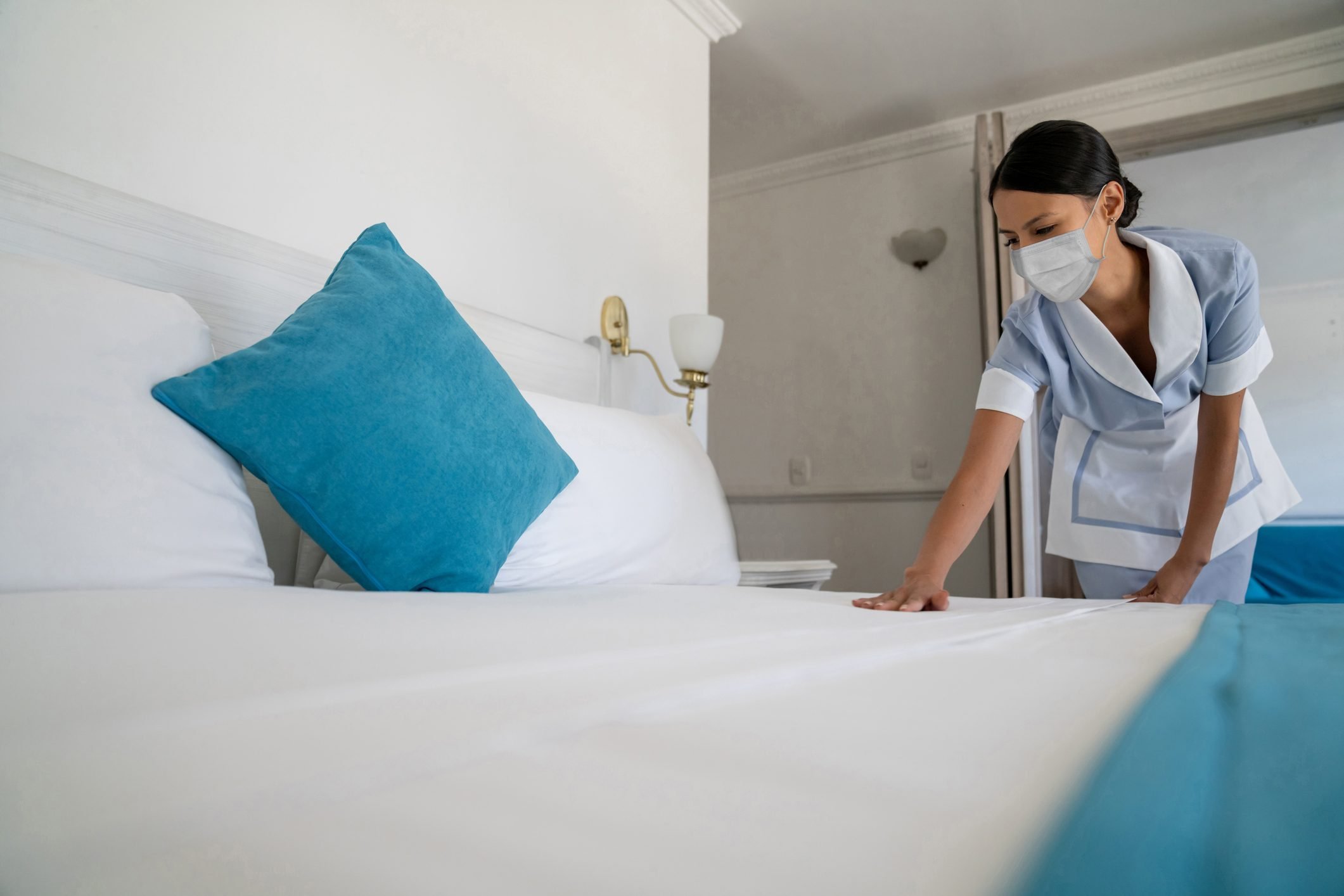
Less frequent housekeeping service
One of the most luxurious amenities of staying at a hotel—daily housekeeping service—has now turned into one of the least desirable, as properties are removing as many unnecessary touchpoints between guests and staff as possible. At Hotel Ketchum in Idaho, for instance, daily housekeeping is no longer offered, however fresh towels and trash collection will be performed upon request (and delivered to and picked up from outside the guest room door).
To further ensure room cleanliness, the Hyatt Reserve Puerto Rico has outfitted every room with UV-light purifying AC systems, which destroys microorganisms instantaneously. Meanwhile, the boutique hotel brand ARRIVE treats each guest room with a non-toxic disinfectant solution of hydrochloric acid delivered via electrostatic sprayer and provides hygienically wrapped bath linens. And some properties are also allowing 24-48 hours between every reservation, so staff has time to deep clean and sanitize—here’s how professional cleaners can tell if a hotel room is clean.
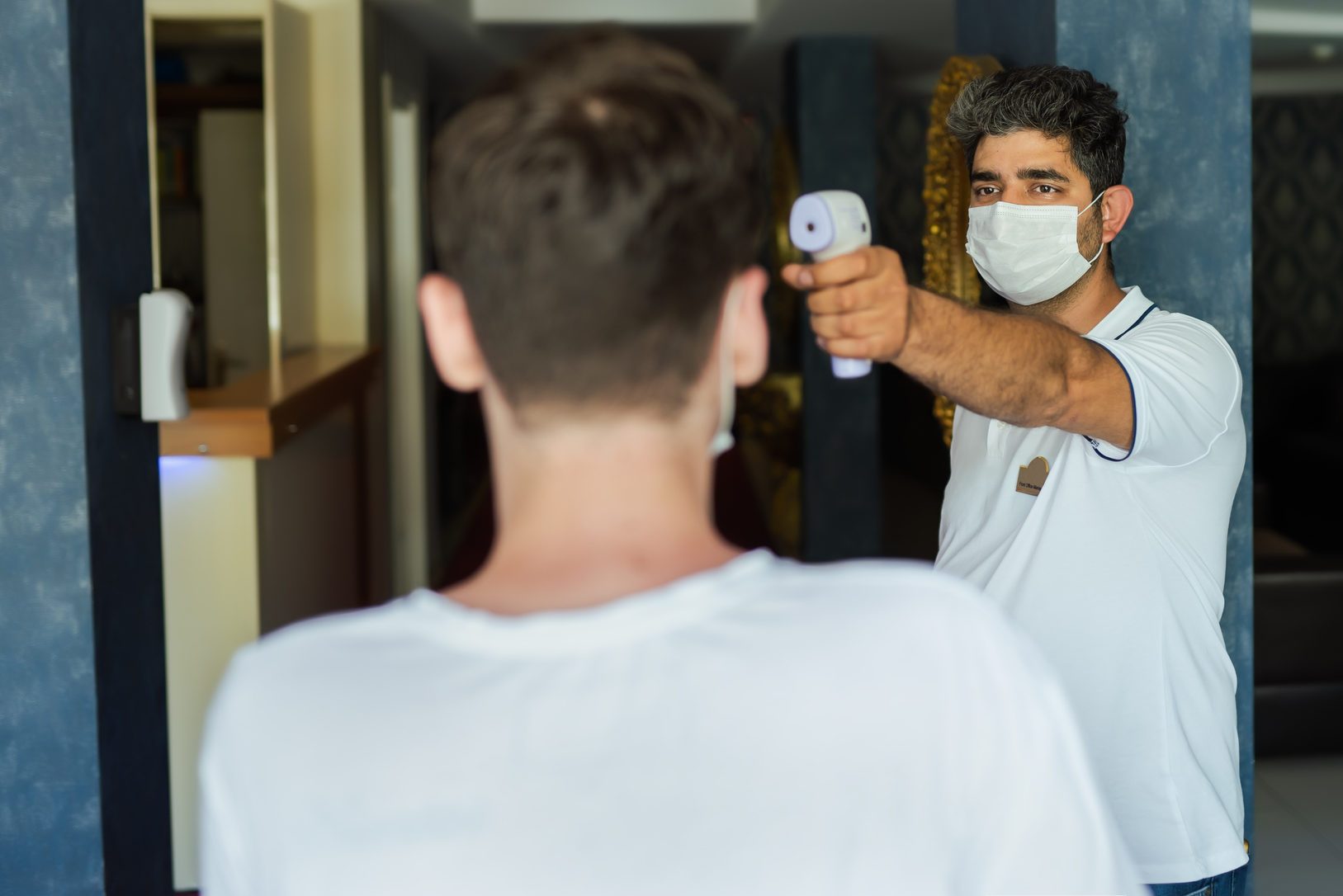
Temperature checks at the door
You’ve probably had your temperature checked more times in the last few months than you have in the last few decades combined—and even hotels are getting in on the action. “Some hotels simply have a member of the security team at the door manually checking temperatures, but others have reconfigured their arrival experience so they can automatically see the temperature of all guests entering at once through infrared scanners,” says DelliBovi. “Clearly, the latter is the better way, as guests don’t even know it’s happening and it doesn’t interrupt a hotel’s arrival experience.” These are 13 everyday habits that could—and should—change after coronavirus.
QR codes replacing menus and paperwork
Although QR codes—those gibberish-looking square matrix barcodes you can scan with your phone—never really took off in the United States and Europe as they did in China, they are suddenly gaining traction. “Instead of handing a guest a menu or any kind of paperwork/information about the hotel and its grounds, guests can now just take a picture of a QR code and it’s all on their phone, instantly,” says Dellibovi. “Six months ago, they were considered failed technology, but now they will be a big part of our lives moving forward.” There’s a built-in QR reader in many newer smartphones, or you can download a free app. Find out what “smart hotels” mean for your privacy.

Goodbye breakfast buffets
If you’ve always loved heading downstairs to the hotel lobby or restaurant for a self-serve continental breakfast, prepare for a disruption to your morning routine. “Buffet breakfasts will come to an end, which is a huge deal because many hotel dining areas and kitchens are not equipped for full-service breakfast,” explains DelliBovi. “You might see breakfast being removed altogether from two- and three-star hotels that currently use that service to attract travelers.”
But don’t worry, you won’t starve—here’s what hotel buffets will look like now. La Russo says that grab-and-go style food amenities will become prevalent. “These grab-and-go stations will be incorporated into future lobby design, and replace the space once used for communal coffee or breakfast buffets,” he says. “If a coffee and tea station still remains, it should be manned by an employee to protect from cross-contamination from other guests.”
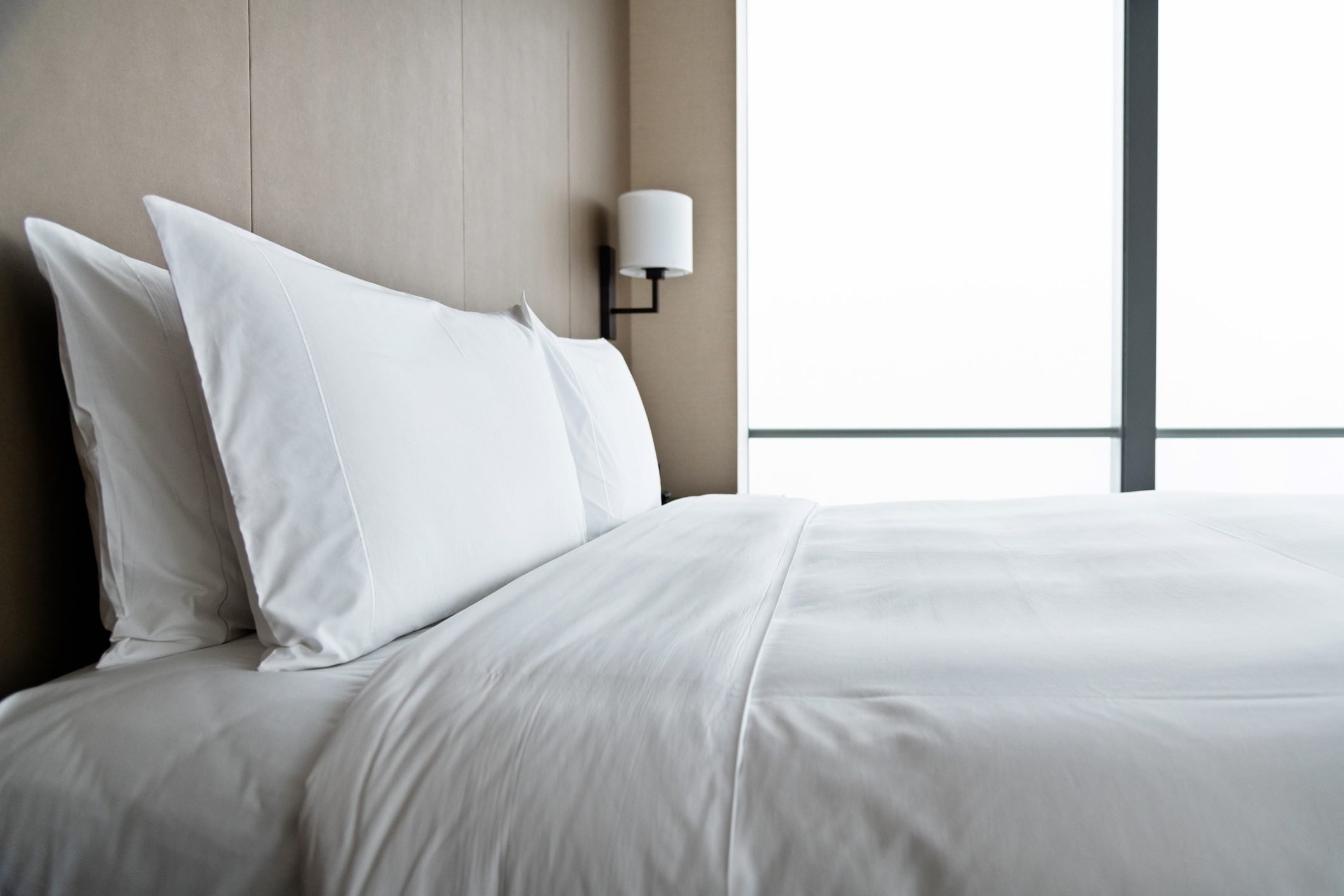
Removal of some décor and amenities
Have you grown accustomed to cozying up to the decorative pillows adorning your hotel room’s loveseat? Love snuggling under a king-sized duvet? Since they are nearly impossible to sanitize, DelliBovi says you’ll be seeing a lot less of them moving forward. But that’s not all that’ll be missing.
“Amazon Alexa and other artificial intelligence options have been implemented in some hotels in order to reduce contact with in-room amenities,” says Michelle Anseeuw, CEO of Valorem Group, a collection of hotel industry experts who provide sales and marketing solutions to hospitality clients. “Pens and notepads, bibles, menus and more have been removed from the room, and information is now available via the television.”
Oh and the TV remote control—which, even before the pandemic was already one of the 11 dirtiest spots in every hotel room—will be getting an upgrade, too. “Now they have these flat-faced ones covered with medical-grade plastic that can be disinfected,” says Taffer.
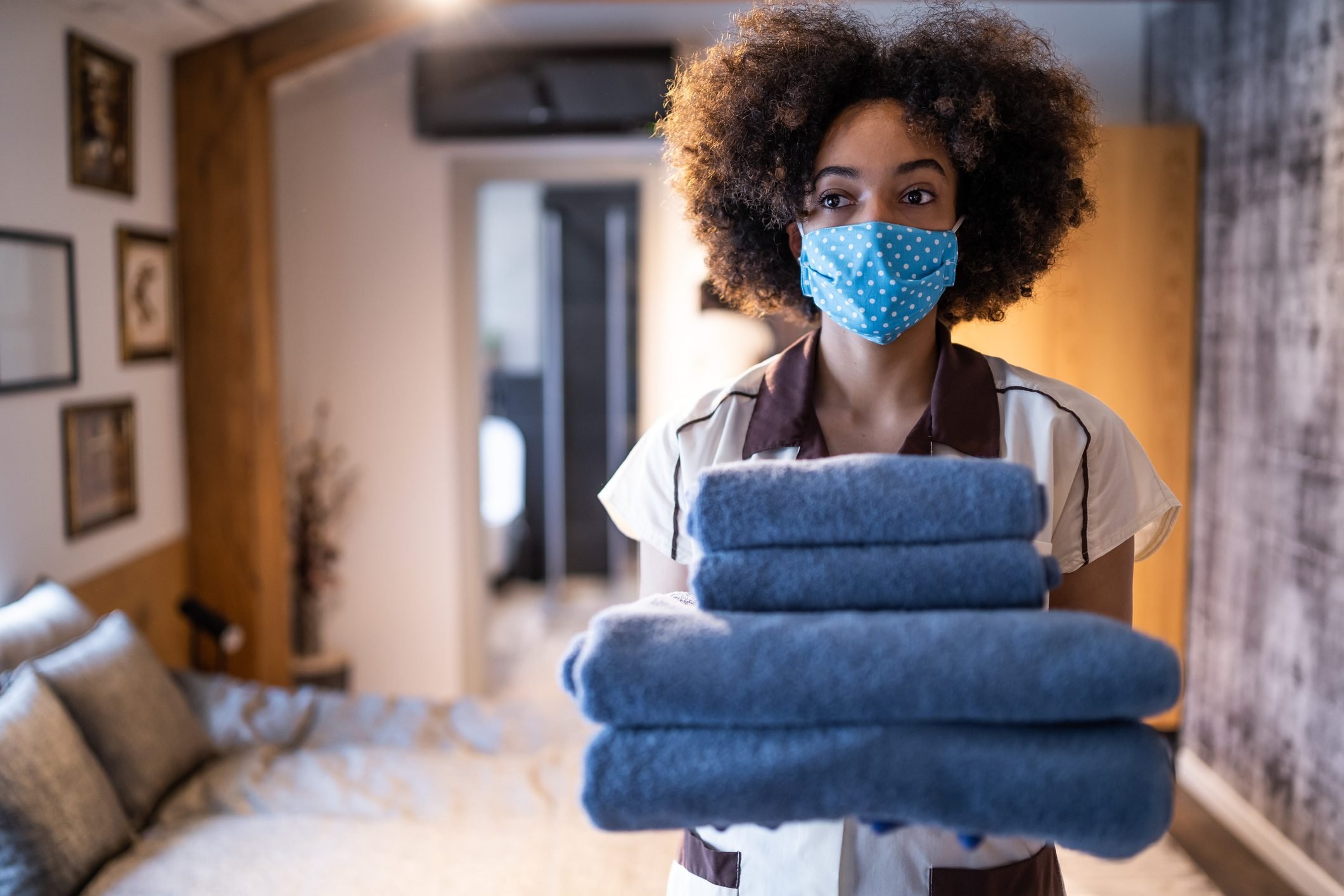
Higher costs on the horizon?
For most of this year, hotels have lost significant business from all segments of travel, including vacationers, corporate travel, and social events, like weddings. When you add in new payroll costs (remember the hygiene manager?), pricey cleaning chemicals, personal protective equipment (masks and gloves), technology and training to their already strained bottom lines, it’s safe to assume some of this cost will have to be passed along to the guest.
“It’s a huge cost factor, particularly in more modest hotels and properties,” says Taffer, who predicts some of that cost may be recouped in the form of a COVID-surcharge, much like a resort fee or room service fee. “But it’s an investment that needs to be made. It’s a real commitment. There can’t be outbreaks in our properties. We know that. We can’t have employees getting sick. We’re fighting for our lives and we as an industry really do feel that level of pressure to get this right.”
DelliBovi agrees: “If a hotel wants to remain a profitable business, it will have to go over the top in being safe to earn travelers’ trust. But staying safe is expensive, and I believe many hotels will be closing by the end of 2020. This will create less supply and expanded costs. Expect hotel rates to increase once we are stabilized regarding COVID.” Find out more things that will start costing more due to the pandemic.
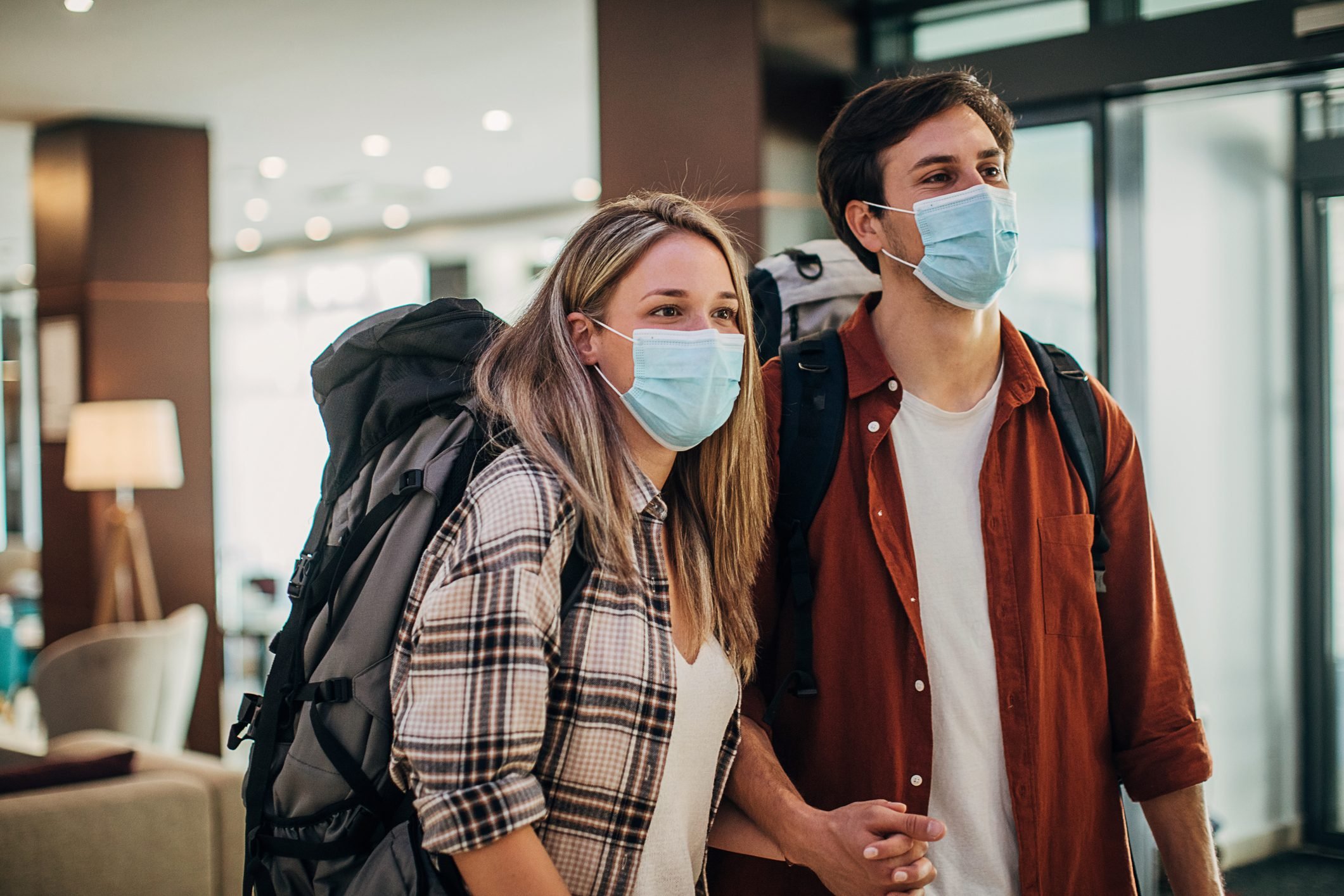
Wear your mask and respect the 6-foot rule
On July 16, 2020, the American Hotel & Lodging Association (AHLA) released the “Stay Safe Guest Checklist” for guests on how to travel safely while also creating a standardized safety experience nationwide. It includes requiring face coverings in all indoor public spaces and practicing social distancing in common areas.
For Taffer, these have been the missing pieces all along. “We make decisions as a hospitality industry all the time that alienate a certain segment of the population — by music choices, price points, concept, family-friendly or not,” he says. “But the industry has not had the courage to force customer behavior to be safe, and that’s the hole in everything. All these processes, systems, and technology we’ve talked about … at the end of the day, if we don’t cause people to behave responsibly by wearing a mask and social distancing, as an industry we’re going to fail. It’s time for the industry to protect itself, too.” These 20 photos will define the era of social distancing.
As Seen in Reader’s Digest:
https://www.rd.com/list/ways-hotels-are-changing-forever/
For more on this developing situation, including how life might be different post-lockdown, see our comprehensive Coronavirus Guide.



